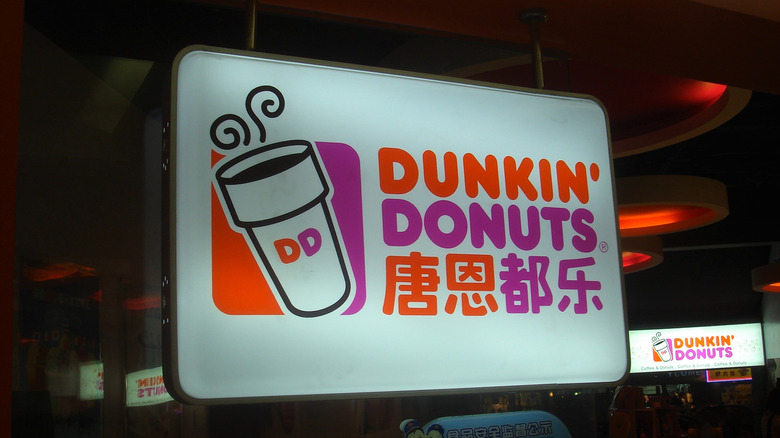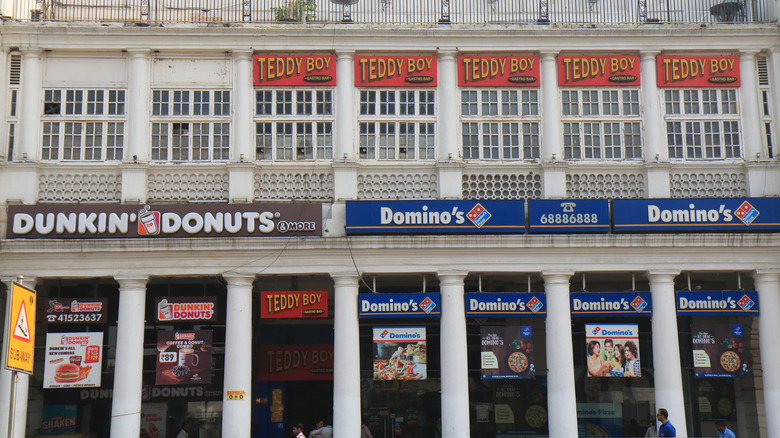Why Dunkin's Expansion Into China And India Was A Total Failure
As the iconic slogan goes: America runs on Dunkin'. Founded in 1948 by Bill Rosenberg as Open Kettle, the coffee behemoth is practically synonymous with the fast-paced, caffeine-fueled American lifestyle. The company boasts over 9,500 locations in the United States, with only seven states without a single Dunkin' location. While the company is heavily associated with the New England region, surprisingly, the state with the most Dunkin' locations isn't Massachusetts, but rather New York, which has over 1,000 cafés. Globally, you can get your Dunkin' coffee and donut fix in 38 global markets, but not all countries embrace the brand with the same enthusiasm as the U.S.
When Dunkin' brought its signature pink-and-orange branding overseas to China and India, the company found that the average consumer didn't quite resonate with donuts for breakfast. To counteract this, Dunkin' implemented some small menu changes to help regionalize its menu to the unique tastes and palates of these nations. This included a number of donuts you can't find in the United States, such as Choco Mandarin in India and Pork Floss n China. Despite these regional changes, the company's expansions into those two countries ultimately fell short of expectations.
Why Dunkin' failed in China
In 1994, Dunkin' (then known as Dunkin' Donuts), attempted to break into the Chinese market. While the company had great aspirations for success, the brand wasn't strong enough in China to get consumers into its cafés as it expected. For one, Chinese breakfasts are typically savory, so a sweet dessert, such as an American-style donut, didn't resonate with consumers. Even still, Chinese desserts are often much less sweet than American desserts, leaving many of the nation's consumers displeased after tasting a Dunkin' donut for the first time. Moreover, the company struggled to make enough donuts to stock shelves, resulting in stale products and frequent shortages. Dunkin' left the Chinese market soon after but tried again in 2008, seeing little success for the second time.
In 2015, Dunkin' set its sights for a third time on China, with its most ambitious plans yet. In a deal worth $300 million, the company partnered with Jollibee Foods Corp., one of the largest fast-food companies in Asia, and Jasmine Asset Holding, an investment firm subsidiary, to create a joint venture called Golden Cup. Golden Cup would aim to open over 1,200 Dunkin' cafés in China. With this new model, Dunkin' tried to capitalize on its New England roots, creating stores with Massachusetts-themed decorations and imagery. In 2022, however, Jollibee terminated its contract with Dunkin', choosing instead to focus on its bigger businesses already established in China. That year, Jollibee owned and operated 486 Chinese storefronts.
Why Dunkin' Failed in India
In 2012, Dunkin' chose to provide exclusivity in its Indian franchising to Jubilant FoodWorks Ltd., a food service company with over 3,000 restaurants across six global markets. Since 1996, Jubilant FoodWorks has been responsible for the highly successful Indian expansion of Domino's Pizza, which saw its 2,000th store opening in June 2024. But unlike Domino's, Dunkin' struggled to connect with the average Indian consumer. For one, the American-style, on-the-go breakfast isn't the norm in the country, with most Indians preferring a sit-down breakfast with traditional Indian cuisine. Not only that, but Dunkin's signature item — the donut — isn't regarded as a breakfast food in India, but rather a sweet pastry that's consumed as a dessert from time to time on special occasions.
In response to these differences, Dunkin' attempted to rebrand itself to better match the cultural norms of the average Indian consumer. This includes the addition of veggie burgers and sandwiches to its menu in hopes of attracting India's large vegetarian population and donuts themed around Diwali. The company even went so far as to rename itself "Dunkin' Donuts and More" to highlight its menu changes.
Outside of its menu, Dunkin' expanded into the Indian market at a rate that wasn't sustainable for the company. With many large retail locations in crowded metropolitan areas, operating costs were extremely high. In 2018, the company shifted its focus to small food kiosks, but even this wasn't successful. As of June 2023, only 21 Dunkin' locations in six cities are still open in India.


